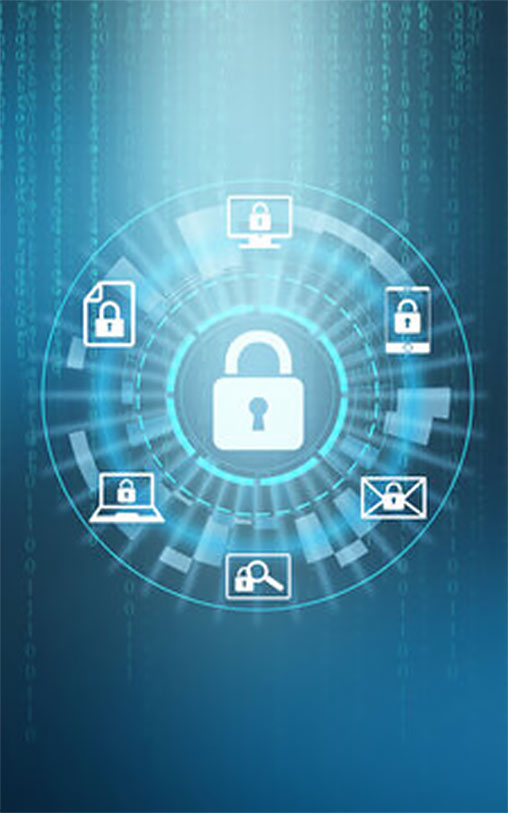Peter Robert
December 12, 2022
Expert Computer Solutions (ECS) provides managed cybersecurity services to small businesses and midsize companies.
Cyber Security is a cornerstone of IT services, and it has become a top priority for businesses due to the high cost of cyber-attacks. Attacks can include identity theft, ransomware, and data breaches that expose sensitive information to the public, putting your life’s work at stake.
Any company, regardless of its size, should place paramount importance on cyber security. Expert Computer Solutions employs cyber security experts ready to protect your systems and data from unauthorized access, data theft, and any security-related concern. We take a proactive approach to keeping your most sensitive information safe. Therefore, we deploy comprehensive plans to respond in case a cyber-attack occurs.
Who We Serve
Expert Computer Solutions provides cybersecurity services to companies with ten or more employees.
We collaborate with customers seeking a trusted and reliable cybersecurity partner capable of handling all the technology-related aspects of their business seamlessly.
We have a wealth of experience and expertise within the following industries: Manufacturing, Healthcare, Energy (Oil &Gas), and Finance.
At Expert Computer Solutions, we focus on understanding the intricacies of each industry we serve to ensure we are fully aware of its specific technology-related issues. We specialize in providing comprehensive cybersecurity solutions for Manufacturing, Energy, Finance, and Healthcare companies in Houston.
We do not believe in cookie-cutter approaches when it comes to cybersecurity. We tailor our cybersecurity solutions to meet the unique needs of each client, ensuring that your business is safe from the ever-evolving landscape of cyber threats and is able to mitigate associated risks. We provide an extended range of cyber security solutions designed for medium and small businesses.
Contact us today to learn more about how we can help you safeguard your company.

Check out why other Houston Companies choose Expert Computer Solutions
Our company uses ECS and they have never failed to resolve any i.t. issues we have had, thus far. Their interactive emails showing progress are very much appreciated. If you need an i.t. team and don't have one on site, I highly recommend. Deborah McDonald. AXON Energy Services
Brett F
Great people and very responsive service. If you’re a small/medium sized company not ready to hire a full time IT employee(s), ECS is a great alternative. We’ve used them for server space, computer software/hardware support, fraud control, and even ERP/MRP implementation.
Daniel F
We outsourced our IT to ECS and we experienced a great service. Before we always had issues but since we switched to ECS there was no outage or downtime. All our workstation are working great and the support team is always there for us. The price structure is clear and understandable even if you have no knowledge about IT. I can highly recommend this professional service provider for your IT services.
Emory F
We use ECS for all of our IT support at work and they are really good. They respond to support tickets pretty quick and are always polite and helpful. So far I've only had good experience with them, they've always found a way to resolve an issue or find solutions.
Anana V
ECS is the IT vendor for my place of work and they have been incredibly helpful during COVID quarantine when many of us had to start working from home. They are able to troubleshoot remotely and have made the transition process quite seamless, in my opinion. They can usually solve issues very quickly and do the necessary work to understand any additional underlying problems. 100% would totally recommend!
Omkar H
Rich (with ECS) is always helpful. He is the best listens calmly and resolve issues in no time.
ECS provides comprehensive managed cybersecurity solutions and support to businesses in Houston and the surrounding areas. We understand that cybersecurity is a constantly evolving landscape, and we are committed to helping our clients stay ahead of the curve. In addition, we offer ongoing management and support to ensure that our solution remains effective over time.








We use top-of-the-line security software and hardware to protect your data. Our team of experts is constantly monitoring our systems to ensure that your data is always safe. In the event that something does happen, we have a comprehensive backup and disaster recovery plan in place to make sure your data is always safe and secure.

We take the time to listen to your concerns and get to know you. We want to understand your unique situation so that we can provide the best possible service. Our skilled professionals are here to help you, and we'll work together to find the best solution for your needs.

Each project is unique, requiring a personal approach and vision. Together we identify the most important points of your business that need service and support. We are preparing an initial roadmap that will help in the further implementation of IT solutions.

We discuss various topics and share our opinions. This allows us to gain different perspectives and better understand each other. Through these conversations, we grow closer as a team and build relationships that last.

When you come to us with a problem, we sit down and brainstorm possible solutions with you. We're not satisfied until we've found a solution that fits your needs perfectly. And once we've found it, we'll work with you to make sure it's implemented smoothly.

Our support team is always available to help your team with any questions or issues that may arise. We're here to help you succeed, and we'll do whatever it takes to make sure your team has everything it needs.
Expert Computer Solutions (ECS), a technology consulting company that uses innovative technology to empower businesses, has been helping Houston-based businesses do more with less since 2005.
Our passion to help small businesses operate efficiently by leveraging big business technology inspired us to start ECS.

Cybersecurity solutions encompass a wide range of products and services designed to protect businesses and individuals from online threats.
These solutions can include everything from antivirus software and firewalls to intrusion detection systems and incident response planning. In today's increasingly interconnected world, cybersecurity solutions are essential for businesses of all sizes.
By taking proactive steps to protect their networks and data, businesses can reduce the risk of costly cyberattacks. Furthermore, by implementing cybersecurity solutions, businesses can create a stronger overall security posture and help to safeguard their critical assets.
While there is no foolproof way to prevent cyber security threats, there are some steps that organizations can take to reduce their risk.
One is to educate employees about best practices for keeping data safe, such as using strong passwords and avoiding clicking on links from unknown sources.
Additionally, it is important to have robust security measures in place, such as firewalls and intrusion detection systems. Regularly updated antivirus software is also crucial for preventing malware infections.
By taking these precautions, businesses can minimize their chances of becoming victims of cybercrime.
In today's increasingly interconnected world, cyber-attacks are becoming more and more common.
While the best way to prevent an attack is to take proactive steps to secure your systems, there are also a number of things you can do to minimize the damage if an attack does occur.
First, it is important to have a clear understanding of your organization's critical assets and make sure they are properly protected. You should also have a plan in place for how to respond to an attack, including who to contact and what steps need to be taken.
Finally, it is essential to keep your systems up-to-date with the latest security patches and updates. By taking these steps, you can help protect your organization from the potentially devastating effects of a cyber-attack.
Cybersecurity solutions help businesses to protect themselves against a range of potential online security threats.
These threats can include viruses and malware, phishing attacks, hacking and data breaches. By implementing various security measures, businesses can reduce the chances of becoming the victim of a cyber attack. This can help to protect both the business itself and its customers.
In addition, cybersecurity solutions can also help to identify any potential security issues before they become a problem. By taking proactive steps to secure their online presence, businesses can minimize the risk of disruption and financial loss.
Cybersecurity solutions can mitigate problems such as these:
Human error: The vast majority of security breaches are due to human error, not malicious intent. Simple things like weak passwords, unsecured devices, and ignoring security updates can leave organizations vulnerable to attack. Put simply, employee education is critical to protecting your business from cybersecurity threats.
External threats: As hackers become increasingly skilled at finding ways to penetrate systems, external threats to organizations are growing. Cybersecurity experts must stay ahead of the curve to keep systems safe. Organizations can also take steps to reduce their vulnerability to attacks, such as by increasing awareness among employees about how to protect themselves and their data.
Insider criminal activity: Insider criminal activity is a realty that data professionals have to face. It can be hard to track down the source of the problem and even harder to protect against it. But by staying vigilant, and keeping up with the latest trends in data security, you can help reduce the risk of insider criminal activity.
Unsecured cloud storage: As cloud servers become increasingly popular, the issue of unsecured cloud storage is becoming more prevalent. This is a serious concern for businesses and individuals who use cloud services, as it can lead to data loss or theft. There are a few steps you can take to secure your data, including encrypting your files and using a reputable cloud storage provider.
Third-party app security: Third-party app security is a concern for many businesses. Not all programs are created with data privacy in mind, which can make sensitive information vulnerable. To keep your company's data safe, it's important to be aware of the risks and take steps to protect yourself.
Subpar IT processes: Sometimes, small businesses don't have the funds to invest in quality IT processes. This can lead to subpar performance, frustrating customers and ultimately damaging the company's bottom line. By investing in quality IT now, small businesses can avoid these problems and set themselves up for success.
There are three main types of IT security solutions: prevention, detection, and response.
Prevention solutions help businesses stop attacks before they happen. Detection solutions help businesses identify attacks that have already occurred. Response solutions help businesses contain and recover from attacks.
Each type of solution has its own advantages and disadvantages, and businesses should select the type of solution that best meets their needs. Prevention solutions are typically the most expensive and require the most manpower to implement, but they can be highly effective at stopping attacks before they happen.
Detection solutions are less expensive and require less manpower, but they can only identify attacks after they’ve already occurred. Response solutions are typically the least expensive and require the least manpower, but they can only help businesses contain and recover from attacks after they’ve already occurred.
Many large organizations have their own in-house security team. This team is responsible for protecting the organization's digital assets from cybersecurity threats. The team works diligently to identify and mitigate any potential risks. By having a dedicated security team, organizations can better protect themselves from the ever-changing landscape of cybersecurity threats.
Outsourcing cybersecurity is an excellent way for businesses to keep their systems secure without breaking the bank. By partnering with a reputable security firm, businesses can rest assured that their data and networks are safe from attackers.
In the age of software as a service (SaaS), cybersecurity solutions play an important role in protecting businesses and data. By implementing security measures such as two-factor authentication and malware protection, businesses can minimize the risk of data breaches and cyber-attacks. In addition, educating employees on cyber security best practices can help create a culture of security within the organization. By taking these measures, businesses can keep their data safe and secure in the ever-changing digital landscape.
Management is responsible for ensuring cybersecurity measures are in place and effective. This includes ensuring that employees are properly trained in security protocols and that system updates are regularly performed. cybersecurity is a critical issue for businesses today and management must be diligent in protecting their organization.
5) Operational cybersecurity
Operational cybersecurity involves the protection of computer networks and systems from operational vulnerabilities. In other words, it helps to ensure that critical systems and data are safe from attack, unauthorized access, or theft. Operational cybersecurity is a vital part of any organization's security posture. Without strong operational cybersecurity measures in place, an organization is at risk of suffering a devastating breach that could jeopardize the safety of its people, operations, and reputation.
6) Physical cybersecurity controls
Most organizations understand the need for physical cybersecurity controls, such as security cameras and access badges. However, many fail to properly implement these controls. As a result, their facilities are left vulnerable to attacks. An effective physical security plan starts with a comprehensive risk assessment. This will help you identify which areas of your facility are most vulnerable. Once you know where your weaknesses are, you can start working on securing them.
There are many types of cybersecurity services available to businesses, but they all share the common goal of protecting electronic data from unauthorized or criminal use.
The most basic type of service is data encryption, which scrambling data so that it can only be read by authorized users. Another common service is firewalls, which act as a barrier between a company’s network and the internet, blocking access to unwanted traffic.
Cybersecurity services also often include malware detection and removal, which can protect against viruses and other malicious software. In addition, businesses may also purchase insurance policies specifically designed to cover damages caused by cyberattacks.
By working with a cybersecurity provider, businesses can create a comprehensive plan to protect their electronic data from theft or harm.
These common threats that cybersecurity services target can include:
Malware: Malware — or malicious software — is a type of software designed to damage or disable computer systems. Malware can be spread through email attachments, illegitimate websites, infected advertising, and more. Malware can result in costly repairs, data loss, and lost productivity. Protect your computer by keep your operating system and security software up to date, avoiding questionable websites, and being cautious about email attachments.
Ransomware: Ransomware is a type of malware that restricts access to a computer or file until a ransom is paid. Ransomware can be incredibly damaging to businesses and individuals, as it can prevent them from accessing their vital data. In some cases, ransomware can encrypt files, making them completely inaccessible.
Phishing: Cybercriminals use phishing to obtain data by pretending to be a legitimate organization or individual. They may send emails, texts, or pop-up messages that appear to be from a trusted source, such as a bank or government agency. Phishing scams can be difficult to spot. They may look like they're from a familiar sender and may even include the logos or branding of the organization they're impersonating. If you receive a suspicious message, do not reply or click on any links. Contact the organization directly to verify the message.
Distributed denial of service (DDoS) attacks: DDoS attacks prevent access to a resource by overwhelming it with requests from multiple computers. This type of attack is usually carried out by bots that are under the control of a single individual. DDoS attacks can have a major impact on businesses, organizations, and individuals.
While it's true that small businesses are often targets for cyber criminals, it's also true that they can take measures to protect themselves.
Chief among these is implementing a comprehensive cybersecurity solution that covers all the angles. This means not only having a strong antivirus program in place, but also ensuring that there is a robust firewall protecting the network and that all devices connected to the network are secured.
Small businesses need to be proactive about their cybersecurity. They can't afford to wait until they're hacked to take action. By taking steps to secure their networks and devices now, they can help ensure peace of mind and protection against costly malware, ransomware, and bots.
In today's business environment, small businesses face a number of unique challenges when it comes to cybersecurity. They often lack the resources of larger businesses, making them more vulnerable to attack. They also tend to be less prepared, with fewer security measures in place. As a result, small businesses are often the target of cyber-attacks.
There are a number of steps that small businesses can take to protect themselves from these attacks. First, they should ensure that their network is secure and that all data is encrypted. They should also create a backup of all data in case of an attack.
Finally, they should educate their employees on cybersecurity best practices. By taking these steps, small businesses can reduce their risk of becoming the target of a cyber-attack.
Five additional actions small businesses can take are:
Update your software: One of the most important things you can do to protect your small business from a cyber attack is to keep all of your software up-to-date. Outdated software is one of the most common ways that hackers gain access to small businesses’ networks.
Education your employees: Educating your employees on cybersecurity best practices is one of the best ways to protect your small business from an attack. Employees should be trained on how to identify phishing emails, as well as how to keep their passwords safe.
Move your storage to the cloud: Storing data in the cloud is a great way to protect it from hackers. Cloud storage providers typically have much better security than small businesses can afford on their own.
Have a response plan: In the event of a cyber-attack, having a plan in place to quickly respond can help minimize the damage. This plan should include who to contact, what steps to take, and how to communicate with customers and employees.
Get Cyber security insurance: Cyber security insurance can help cover the cost of a cyber attack, as well as the cost of recovery. This can be a valuable safety net for small businesses.
As a small business owner, you can't afford to ignore cyber security. With cybercrime on the rise, it's more important than ever to have a plan in place to protect your business. But what should your cyber security plan look like?
Here are some key elements to include in your cyber security plan:
1. Identify your assets and vulnerabilities. The first step is to identify what assets you need to protect and what vulnerabilities could be exploited by attackers.
2. Implement security controls. Once you've identified your assets and vulnerabilities, you need to put in place security controls to protect them. This might include things like firewalls, intrusion detection systems, and encryption.
3. Train your employees. Your employees are one of your biggest cyber security assets, so it's important to train them on how to stay safe online. Make sure they know how to spot phishing emails and other common cyber attacks.
4. Test your plan regularly. Cybersecurity is an ever-evolving field, so it's important to regularly test your plan to make sure it's still effective. This might involve things like penetration testing and vulnerability scans.
By following these steps, you can create a comprehensive cyber security plan that will help keep your business safe from attacks.
The Most Important Cybersecurity Strategies for Small Businesses in 2022.
When it comes to business cybersecurity, there is no one-size-fits-all solution. The best approach for your company will depend on a variety of factors, including the size and nature of your business, your sector, and the types of data you handle. However, there are some common cybersecurity measures that all businesses should consider. These include installing firewalls and antivirus software, encrypting sensitive data, and implementing strict access controls.
By taking these steps, you can help to protect your business against the most common cyber threats. However, it is also important to keep up to date with the latest security trends and developments, as new threats are constantly emerging. By staying informed and taking proactive measures, you can help to keep your business safe from cybersecurity threats.
Cloud security. When it comes to cloud security, there are a few key points to keep in mind. First and foremost, security in the cloud is all about data protection. This means keeping your data safe from unauthorized access and ensuring that only authorized users can access it. Another important aspect of cloud security is ensuring that your data is backed up and accessible in case of an outage or other disaster. Finally, you'll need to monitor your cloud environment regularly to ensure that everything is running smoothly and that there are no potential security risks. By following these simple tips, you can ensure that your data is secure in the cloud.
Network security. When it comes to network security, there are a few key things to keep in mind. First and foremost, you want to make sure your network is well protected. This means having a strong firewall in place, as well as security software that can help to keep your network safe. Additionally, it's important to keep your network encrypted, so that only authorized users can access it. Finally, you should always keep an eye on your network traffic, so that you can spot any potential threats. By following these simple tips, you can help to keep your network secure.
VPNs and firewalls. Virtual private networks (VPNs) and firewalls are two ways that businesses can secure their networks. VPNs encrypt data that is sent over the network, making it difficult for unauthorized users to access the data. Firewalls act as a barrier between the network and external computers, preventing unauthorized access to the network.
Updates and upgrades. As new threats emerge, it is important to keep your business's cybersecurity measures up to date. This may include installing new firewalls and antivirus software, as well as upgrading your existing security systems. It is also important to keep up to date with the latest security trends and developments so that you can identify new threats early and take steps to protect your business.
Data backups. Data backups are important for businesses of all sizes. Small businesses can benefit from data backup services that are simple to use and maintain. Backing up data can protect businesses from data loss due to software crashes, power outages, or user error.
Segmented and limited access. One of the most effective ways to protect your business against cybersecurity threats is to segment and limit access to sensitive data. By doing this, you can help to prevent unauthorized access to critical information. You can also use access controls to limit the amount of data that employees can see and edit. By taking these steps, you can help to reduce the chances of data leaking.
Employee training. Another important measure that businesses should take is to train employees on cybersecurity. By raising awareness of the risks and teaching staff how to identify and avoid threats, you can help to protect your business against cyberattacks. You can also implement policies and procedures to limit the chances of data breaches.
Security culture. Creating a culture of security within your business is another important measure. This involves instilling a sense of responsibility for cybersecurity in all employees. By doing this, you can help to create an environment where everyone takes ownership of the security of the business. This can go a long way towards preventing data breaches and protecting your business against cybersecurity threats.
Cybersecurity is increasingly becoming a top priority for businesses of all sizes. In the wake of high-profile data breaches, organizations are under pressure to shore up their defenses against cyberattacks. But with the cost of cyber security tools and services continuing to rise, how much should a small business actually be spending on cyber security?
As per a recent report from Deloitte, the average business will invest between 6% and 14% of its annual IT budget in cybersecurity. This represents less than a quarter of the total budget allocated to cybersecurity in general, which is actually quite good. In general, most businesses spend around 10% of their IT budget on average.
For small businesses, the key is to focus on identifying and protecting the most valuable assets. This may require working with a cyber security specialist to assess the risks and implement the appropriate controls. While there is no one-size-fits-all answer, small businesses should aim to allocate at least 6-10% of their overall IT budget towards cybersecurity. By taking a proactive approach to cyber security, businesses can protect themselves against costly data breaches and other threats.
In the era of digital business, companies are increasingly reliant on technology to power their operations. This dependence comes with increased risk, as businesses are now susceptible to a wide range of cyber threats.
These threats can result in data breaches, financial loss, and reputational damage. Fortunately, there are a number of cybersecurity solutions that businesses can use to protect themselves.
These solutions include firewalls, intrusion detection systems, and malware removal tools. By implementing these solutions, businesses can safeguard their data and reduce the risk of cyberattacks. In addition to protecting businesses from external threats, cybersecurity solutions can also improve employee productivity by blocking distractions such as Adware and Ransomware.
As a result, investing in cybersecurity is a wise decision for any business that is looking to protect its data and increase its productivity.
Among the many cybersecurity risks facing small businesses, it can be difficult to know where to start in terms of protecting your business. A cybersecurity checklist is a great tool to help you assess your risks and develop a plan to address them. There are a number of online resources that offer cybersecurity checklists for small businesses.
The Small Business Administration (SBA) has a cybersecurity self-assessment tool that can help you identify key cybersecurity risks and create a customized plan to address them. The SBA's website also offers a range of other resources on cybersecurity for small businesses.
In addition, the U.S. Department of Homeland Security provides a cybersecurity checklist for small businesses on its website. Taking the time to review these resources and develop a cybersecurity plan can help you protect your business from potential threats.
Call Expert Computer Solutions and get your free cybersecurity checklist - (713) 782-4357.
At industrial cybersecurity, we provide comprehensive solutions that address the unique cybersecurity needs of a variety of industries.
Healthcare organizations face a unique set of challenges when it comes to protecting patient data and ensuring compliance with regulations. Our team of experts has a deep understanding of the healthcare industry and can provide tailored solutions that meet the specific needs of our clients.
Financial institutions must balance the need to protect customer data with the need to maintain a high level of customer service. Our team has extensive experience in the financial sector and can provide solutions that are both effective and efficient.
Manufacturing companies must protect their intellectual property and confidential information, while also ensuring the safety of their employees and customers. We offer a range of solutions that are designed to meet the specific needs of manufacturing companies.
Retail companies must protect customer data and ensure compliance with data security regulations. Our team has extensive experience in the retail industry and can provide tailored solutions that meet the specific needs of our clients.
Government agencies must protect sensitive information while also ensuring compliance with data security regulations. We offer a range of solutions that are designed to meet the specific needs of government agencies.
Educational institutions must protect student data and ensure compliance with data security regulations. Our team has extensive experience in the educational sector and can provide tailored solutions that meet the specific needs of our clients.
And others.
As a small business, the percentage of employees who have access to business-critical data and systems is much higher than at a corporate giant. This means more than ever, your employees are your first line of defense. If one of your employees is breached, it’s much more likely they have access to sensitive information than one of the tens of thousands of employees at a Fortune 500 company.
Unfortunately, this also means that small businesses are much more vulnerable to attacks that exploit weak or stolen employee credentials. In fact, 81% of data breaches originate with phishing attacks that trick an employee into revealing their login information. That’s why it’s so important to educate your employees about security risks and best practices.
Make sure they know how to spot a phishing email and remind them never to click on links or attachments from unknown senders. Regular security awareness training can help reduce the risk of a successful attack and make your employees your first line of defense against hackers.
While it's impossible to 100% prevent any type of risk, there are several measures your company can take to reduce the possibility of a data breach.
Assuming you already have antivirus software installed on all devices, educating employees on best cyber practices should be the next step. This can be done through regular reminders and updates on the company intranet, or even short courses offered by outside organizations.
There are also technical measures that can be put in places, such as two-factor authentication or role-based access control. By increasing the number of hoops an attacker has to jump through, you make it that much more difficult for them to gain unauthorized access to your data.
Of course, no prevention strategy is complete without a plan for how to handle a breach if one does occur. By having a team in place who knows what needs to be done, you can minimize the damage and get back to business as usual as quickly as possible.
Taking these steps will not guarantee that a breach will never happen, but they will certainly reduce the chances of it happening to your company.
Despite your best efforts to fend off hackers, sometimes they make it through. They’re quite crafty and invent new techniques every day. Are you prepared to react if a breach does happen? Based on what data was lost or which system was compromised, how will your business proceed? Do you have cyber liability insurance or a validated backup of your data?
When a breach happens, it’s important to react with speed and authority. When Equifax was breached in 2017, the company’s reputation suffered greatly because it did not react quickly enough. In contrast, when Target was breached in 2013, they reacted quickly and decisively, and as a result, their reputation remained mostly unscathed. The bottom line is that if you want to protect your business in the event of a breach, you need to be prepared to act swiftly and decisively.
It's unclear exactly how Equifax could have avoided the massive data breach that affected 143 million people. What is clear, however, is that the company's response to the situation has been nothing short of a complete disaster.
From the initial announcement of the breach, which was convoluted and confusing, to the failure to provide clear and concise information to those who were affected, Equifax has bungled every aspect of its response. And now, reports are emerging that the company was aware of the security flaw that led to the breach for two months before hackers exploited it.
For a company that is supposed to be in the business of protecting people's personal information, this is a complete and utter failure. Whether or not Equifax can salvage its reputation at this point remains to be seen, but it's safe to say that the damage has been done.
As technology advances, so too do the threats to our cyber security. In order to safeguard your company, it is essential to have the proper tools in place to defend against cybercrime. These tools can help to secure sensitive information and prevent unauthorized access to your systems.
Some of the most important tools include firewalls, intrusion detection systems, and anti-virus software. In addition, it is important to have a comprehensive security policy in place that covers all aspects of your business. This policy should be regularly reviewed and updated as needed in order to keep pace with the ever-changing landscape of cyber security. By taking these steps, you can help to ensure that your company is protected against the latest threats.
If you are unsure of what steps to take, there are many resources available that can help you to develop a comprehensive security plan. The Department of Homeland Security provides a wealth of information on cyber security, including guidance on how to create a security policy.
In addition, the SANS Institute offers a variety of resources on its website, including an overview of common security risks. By taking the time to educate yourself on the latest threats and how to defend against them, you can help to keep your company safe from harm.
Cybersecurity is a critical issue for businesses today. With the increasing reliance on technology, it is more important than ever to take steps to protect your company from cybercrime. By following the tips outlined above, you can help to ensure that your business is safe from the latest threats.
Waiting until a cybersecurity breach has occurred is not an effective strategy for protecting your business. It’s important to have a proactive approach to cybersecurity, which includes regular monitoring of your company’s systems and employee education on cyber threats. By being proactive, you can help prevent breaches from happening in the first place.
There are a few key things you can do to proactively protect your business from cybersecurity threats. First, make sure you have an IT policy in place that covers all aspects of cybersecurity. This policy should be reviewed and updated regularly as new threats emerge.
Second, educate your employees on good cyber hygiene practices and what to look out for when it comes to suspicious emails or links. Finally, commit to regular monitoring of your systems so you can quickly identify any potential vulnerabilities. By taking these steps, you can help keep your business safe from cybersecurity threats.
ECS works very closely with world-class technology leaders to provide value added solutions to our clients. We take extra steps required to deliver results. Every partner we work with is evaluated on their ability to deliver a high level of service, support, and the ability to fulfill clients need.







